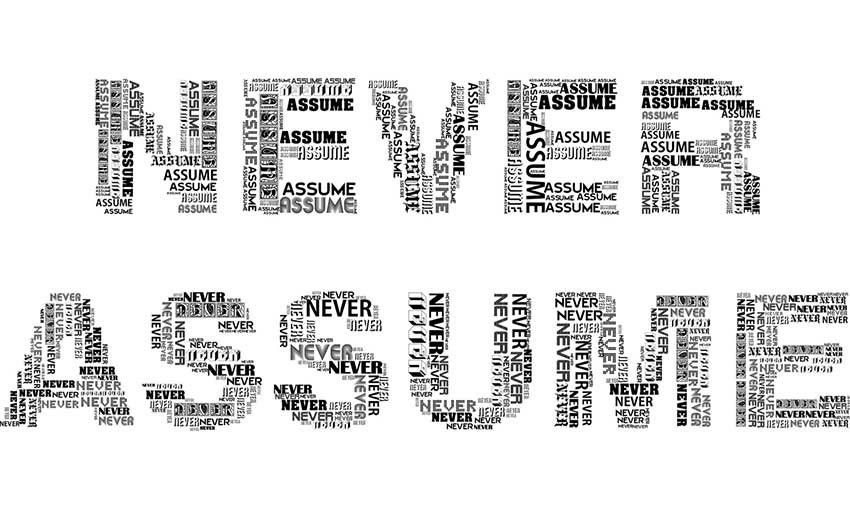
We partner with trusted companies that offer products which help our readers achieve their goals! If you purchase through our partner links, we get paid for the referral at no additional cost to you! Read our disclosure for more info.
It’s easy to be misunderstood in everyday conversation. It can be frustrating, especially when you don’t know if it’s you, or them.
Having a misunderstanding means greater chances of damaging your friendships, your love life, and it could even lead to you changing careers.
In this article, I will discuss what it means to be misunderstood, reasons why it can happen, and what you can do about it.
Let’s dive into it.
Here are 10 reasons why you are always misunderstood:
1. Not Giving enough information
First, let’s look at the meaning of misunderstood:
Misunderstand — for one to understand incorrectly, while thinking one has understood correctly.
To be misunderstood is to be the result of when someone misunderstands you – that the truth behind your motives, intentions, beliefs, or behaviors have been skewed and misinterpreted.
There are many reasons why this could happen to you. One reason is that you haven’t given as much information as possible for your views to make sense.
For example, imagine trying to explain to hypothetical Bob who has never looked up in his life, the importance of gravity, but failing to mention that a sky exists.
It’d be pretty hard to prove the importance and stakes of gravity, considering Bob is missing such a huge piece of the puzzle. If you want the world to exist to him the way YOU see it, you must convince him. And to do that, you can’t leave out vital information.
Holding back information will cause others to fill in your blanks.
The last thing you want is for people to make assumptions about you, and to blow the context of what you mean out of proportion.
What’s the takeaway?
Everyone has their own perspective in life. If you want people to understand your perspective, you can’t leave out important details that make your views unique. Otherwise, it will lead to a misunderstanding.
2. Talking Too Much causes confusion
Even though giving as much information as possible is crucial to being understood, you have to know your limits. By this, I’m referring to your maximum word count.
You should have a maximum word count for your turn in the conversation.
Okay, not an exact word count like you’re submitting a college paper. But you need to know a rough estimate of when it’s time for you to stop talking. Being aware of peoples’ body language is a good way to get the cue that you’re talking too much.
If you talk for too long, others could get bored and stop listening to you. And suddenly, it’s only really you in the conversation, basically thinking out loud.
Don’t be this person. It can be hard for others to keep up with such high quantities of information coming at them.
Sure, you may be passionate about what you’re talking about, but let others have a say, too. You don’t want people to have to apologize for misunderstanding you.
What’s the takeaway?
If you don’t want to be misunderstood, talk long enough to get your points across, but short enough to not bore or be distracting to others.
3. A Misunderstood mind displays little emotions
Not only do you have to give as much information possible to get your point across, in as few words as possible, but you have to serve it with sincere emotions.
You can do this through facial expressions, mannerisms, and the tone and intensity of your voice. Otherwise, if you don’t show any emotions, you are simply giving out information—information that anyone else can share.
Show your human side.
To connect on a human level, you need to express your inner self so that others can embrace your intentions. They need this from you to not only understand you, but to feel you.
Without feelings, your interactions aren’t whole.
Feelings are an especially important part of communication, which is important to be an effective leader. Without them it will be harder for people to like you and relate to you.
With such a diverse society and misunderstanding culture we live in, it can be difficult for others to get a feel of your true self if you don’t express these inner qualities that define your experiences.
What’s the takeaway?
When people get insight into how you are feeling as you speak, they can get a better picture of who you are and your intentions, so you don’t get misunderstood.
4. Drifting From the main point
It can be extremely easy to draft yourself away from the main point in a conversation. This is especially true when you want to say every little detail about a subject you are arguing.
A lot of the time, we have so much on our mind that, once we start pouring everything out, it can be hard to stick to what we actually want to say. We end up falling down the rabbit hole.
Drifting midst conversation can cause you to be misunderstood in a few ways:
- Others may think you don’t actually know what you are talking about.
- You may get lost and forget the main point you were trying to make.
- People could be confused because they stopped paying attention due to your cognitive dissonance tendencies.
- It displays that you actually never had a point in the first place; you were aimless. Think parrots—do you ever actually know what they’re trying to say to you?
Don’t be a parrot. Don’t blabber.
It’s okay to get into details and to branch off a little to make your point clearer, but not if in doing so, it changes the initial direction of the conversation.
What’s the takeaway?
A misunderstood mind is an inconsistent one. Be precise with your points, deliver on time, and don’t stray off topic.
5. Misunderstood due to short sentences
Talking is like writing; you need to keep your sentences short and concise.
In regard to speaking, when you talk, you can usually use both passive and active voice without losing the attention of others. However, in writing, it’s best to use active voice.
For instance, consider this quick example:
- A red fire hydrant is what my dog peed on. (Passive voice)
- My dog peed on a red fire hydrant. (Active voice)
Which example read better? Likely, it was number two. This is because when you read about something doing the action, it speeds up the picture in your head, so you don’t get lost.
The dog is the main subject. The fire hydrant is important, but not as much as the dog. Your readers care that the dog peed, and what it peed on happened to be a fire hydrant.
It’s weird to read passive voice. But when speaking, for listeners it doesn’t matter which you use.
When you hear passive voice, the words are coming too quick for you to lose interest.
The issue when you talk isn’t about active or passive voice, it’s sentence length. Proper conversing has a fine line between speaking in fragments, and speaking without seeming like you are talking to kill time.
Take pauses when you speak. Let there be moments of silence, and it won’t matter if you use active or passive voice.
Try to give others time to process what you are saying before you continue. Otherwise, if you don’t, you risk overwhelming them and being misunderstood.
What’s the takeaway?
There are tons of benefits of reading. However, the level of enjoyment you get from reading usually depends on if it was written in active or passive voice.
Reading something written in passive voice can quickly lose your interest, and a similar effect can happen while listening to someone speak if they aren’t using short sentences.
If you don’t want to be misunderstood, consider using shorter sentences when you speak.
6. Speaking Before Thinking can cause a misunderstanding
You should always plan what you are going to say before letting it come out. Even if it’s for a split second. As Lifehack puts it:
Words are a reflection of who you are.
How often has something you said came out the wrong way? Spewing out what’s on your mind could anger someone, and you might regret it.
Always weigh the pros and cons of what you want to say, and then say it.
This might seem like a long process, but it’s actually not. Our brains process information extremely fast. In fact, according to neuroscientists from MIT, our brains process the data in images in as little as 13 milliseconds!
What this means, is that the moment you say something, you can’t take it back.
You should make it a habit to think about the point of what you’re going to say before you let those first few words out.
What’s the takeaway?
If you don’t want people to misunderstand the things you say, then don’t be spontaneous with your words. Focus on your thoughts before speaking, and it will become quicker in time.
7. Misunderstood because you don’t understand all the information
When you are part of a conversation, it’s crucial to know the details of what you are talking about. If you don’t understand what’s actually going on, how can you contribute rationally without being misunderstood?
Having as much detail as possible about the matter is important for you to form thought-provoking sentences.
Otherwise, if you don’t truly understand the material of the conversation, it can cause others to fill in those missing points and make their own truths about what you may have intended to say.
Ultimately, you being confused could make them confused.
Never be afraid to ask questions.
A clueless person who asks nothing, from the start, will always have nothing, at the end.
What’s the takeaway?
Being misunderstood can happen when you don’t know all the facts. Practicing organizational techniques is a great way to know what information you need to completely understand a topic.
8. Talking fast makes you misunderstood
This section sort of coincides with the section about speaking in short intervals. Someone who typically speaks long, winded sentences usually also talks fast.
It can be hard to follow along with someone who is speaking SO fast, that you literally don’t have a second to breath. This could result in the other person not pulling important information from your sentences, and in the end, failing to understand you.
They will either stop listening and nod their heads, or they will begin filing in those holes with their own thoughts. By the end of the conversation, you may as well have said nothing to them.
This applies both in a personal environment, and professionally. In fact, talking too fast could be a reason you don’t get along with your boss.
Why? Because it’s your job to be accurate, and accuracy lessens when you are spewing information just to get it out.
What’s the takeaway?
Talking too fast can cause a communication misunderstanding, and it can prevent people from following along with your every word.
9. Giving Every single Detail
We’ve talked about giving as much detail in as FEW words as possible, but what about the contrary? Giving TOO much information in as MANY words as possible can also cause you to be misunderstood.
Some details are unnecessary and, often, can be you filling in void space.
Here are some reasons you may give too much detail:
- The topic is one of your hobbies, and you’re excited.
- You’re not comfortable with silence and it makes you awkward, so you fume at the mouth as a crutch.
- You are trying to fool others by seeming as if you know everything about the topic. So, you add extra details to not give them a chance to validate your quantity of information.
- You’re full of energy, and your mouth must expel it.
- It’s simply part of your personality—you love to talk.
- You have a lot to say, and too little time to do it.
Even though it may seem crucial to spill everything you know to get your point across, doing it can definitely be a conversation killer.
Always stick to the necessary details about what you want to say.
What’s the takeaway?
Just like giving too little detail can cause you to be misunderstood, so can too much detail. Know what you want to say, find your balance, and take turns in conversation.
10. Only Thinking About Yourself creates misunderstandings
When you are having a conversation with someone, it’s important to focus less on yourself, and more on others. This way, their ears will be pointed to you and they will fully comprehend every word that leaves your mouth.
When you are speaking about others, they will be 100% focused on what you have to say about them.
Who wants to have a conversation with someone when they only talk about themselves?
Don’t be this person. Just because Jacob caught a 27 inch red fish doesn’t mean you need to tell him about the time you caught a 28 inch red fish.
Don’t always steal people’s thunder.
Let other people shine. Your time will come when your voice will be heard. If you don’t let the voices of others ring loud, it could be distracting for them.
They will linger on standby, WANTING to say something—wanting to be heard—and they won’t be able to relate to you because you have silenced them. You will cause yourself to be misunderstood.
What’s the takeaway?
If you are tired of being misunderstood, do some self reflecting to see if you are letting others take part in your conversations. This is one of the biggest reasons for having a misunderstanding in relationships, and it’s obvious why. Relationships demand the care, attention, and empathy of two people, not one.
Conclusion
There are so many reasons why you may be misunderstood. Actively working on the steps in this guide can help fix this issue for good. Make it one of your goals in life to be understood better, even if it means checking yourself while setting your new years resolutions.
That’s it, my friends. Good luck.
Here’s a quick recap of 10 reasons You Are Misunderstood:
- Not giving enough information.
- Talking too much.
- Not displaying your emotions.
- Drifting from the main point.
- Using short sentences.
- Speaking before thinking.
- Not understanding all the information.
- Talking too fast.
- Giving every single detail.
- Only thinking about yourself.
That’s all folks! Thanks for reading.
Feel free to comment below if you liked this article on 10 reasons you are misunderstood. I’d love to take questions or suggestions on other content you’d like to see on eHowdy!
Share Post ❤️
Aaron McCloud


Most Popular

10 Brain Foods That Boost Your Mood and Mental Clarity

Is Sleeping 6 Hours Enough? (5 Reasons It’s Not)

10 Ways To Find Your Passion and Purpose In Life Today












8 thoughts on “10 Unique Reasons You are Misunderstood [How To Prevent It]”
Wow, this article is fastidious, my younger sister is analyzing such things, so I am going to inform her.
Awesome, thank you!
I am actually thankful to the owner of this site who has shared this great article!
Thanks for reading!
Hello, how is everything? This is an amazing article!
Everything is good. Thanks so much!
Thanks for sharing, this is a fantastic post.
Glad you enjoyed it. Thanks for reading!